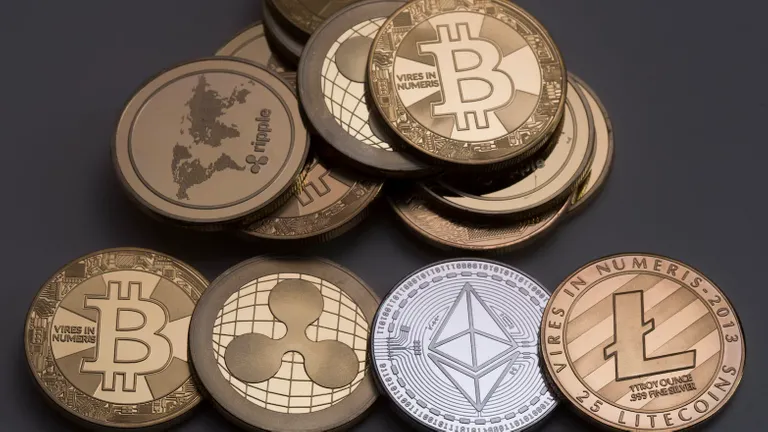
Cryptocurrencies are disruptive economic innovation that have the potential to revolutionize the current economic structure and change how banks and financial institutions operate. Bitcoin is the most popular form of cryptocurrency that enables digital transactions between two parties without the need of an intermediary. Every transaction is digitally recorded in blocks which act like ledgers and once a block is filled a new block is created. All blocks are connected to each other using hashtags and a linear chronological sequence of these blocks forms a blockchain. Thus, every transaction is digitally recorded to keep security at a top notch level. Though the transactions are recorded, the information of the parties participating in the exchange is not revealed. The money can only be tracked when it is converted into cash. This public way of managing transactions has created the possibility of a huge revolution in the banking sector across the world. The economic power which lies with the governments and financial institutions is at stake which has made them wary of cryptocurrencies.
Sources

5 Ways cryptocurrency is Impacting Banking, Finance and the Economie
1•Power to the Dark Web
Dark web is the section of the web that is not accessible through the search engine. What we are given access to is the surface web which is not even half of the existing internet. Dark web is accessible only through special software like Tor Browser which enables anonymous searching of the internet.

Dark web is the place where you can find assassins, weapons and a lot more illegal stuff. By using crypto currencies like Bitcoins people can make illegal transactions without giving any information about themselves. Cryptocurrencies like Bitcoins are a way to empower such transactions across the globe which will ultimately result in increased
2•Speculations
There have been many ups and downs in the value of cryptic and this scenario is likely to continue. Due to the extreme highs and lows crypto present a massive possibility for speculation. Just like trading in shares, trading in crypto is massive and seeing the rise in traction around cryptocurrencies it is likely to grow further.

Another reason accounting to this is the increasing cost of investing in the stock markets. A share in Apple or Facebook can cost around $150 while crypto can be bought in fractions at a price as low as one-tenth of a cent. This makes it an easy target for speculative gains.
3•Politicization of Money:

Earlier all the monetary transactions were enabled through central banks (directly or indirectly). Now, with the evolution of Bill cryptos, the scenario has changed. The power that was vested in the governments and central banks is shifting to the masses. This revolutionary change in transaction handling has the power to change the economic structure. To bring security and enable scrutiny, central banks and financial institutions maintain a record of all the transactions undertaken by the people. Now with digital currencies, this economic power can be challenged by people. This has led to the creation of a new autonomous body which can facilitate transactions. Ultimately if adopted on a large scale, crypto can lead to the politicization of money.
4•Apprehension among the Central Banks:

There have been implications that crypto can be used to secretly launder money outside the country. Central banks across the world have been wary of Bitcoins as an uncontrollable and unpredictable form of currency. Cryptocurrencies are leading to loopholes in the current bank’s data about the money transactions leading to inability to track economic activities. Crypto and Cyberspace has emerged as a power in itself thus bringing a check on the activities of the so powerful governments.
5•The Emergence of New Markets

Cryptocurrencies have led to the emergence of new markets. Currencies like Bitcoin and Ethereum have opened gates for a new kind of market which unlike present money market is controlled by no one. Cyberspace will rise up as the managing body that will handle and maintain such disruptive markets. The near zero transaction cost (along with other characteristics) has made these currencies even superior to the traditional money we are accustomed to using. What can be surely stated is that it is just the beginning and the number of possibilities is endless.
Interesting Facts About Cryptocurrency That Everyone Must Know
•The Founder Is A Ghost
While the idea of a digital currency was actualized decades ago, cryptocurrency was conceived less than 3 decades ago. However, it was never actualized until 2009 and when the real code was developed. However, the surprising thing is that no one owns the king of cryptocurrencies — the bitcoin. The first interesting fact about cryptocurrency: It is credited to Satoshi Nakamoto but there is not real connection. He has not even claimed ownership of the code. This is an ecosystem that is open for people to mine and get commissions as well as rewards. If you are looking for the owner, you will not get anytime soon.
•The Currencies Are Extremely Volatile
In 2009, one Bitcoin was worth $0.003 which is another interesting fact about cryptocurrency. People had not taken note of the currency and were not even interested in its value. By 2017 Dec, the value was $17900 and rising. Today, it has fallen to $6,000. This translates to shedding 2/3 of its value in just two months. This is an indication of the volatility of cryptocurrency. In fact, this is one of the reasons many investors are keeping away from the coins. The value can swing dramatically causing both huge gains and losses. The value is pegged on perception and is not controlled by any central bank or monetary regulator.
•Small Fractions Of Bitcoin Are Called Satoshi
Cyrptocurrencies like bitcoins can be broken down into fractions. This allows buyers to invest in 1/10 of a currency. For instance, if the value of Ethereum is $100, you can buy ½ or ¼. This is an opportunity for many people to invest and gain value over time. It also presents a chance for small scale investors to participate in the cryptocurrency market.
•If You Lose Your Wallet, You Have Lost Your Money
The value of your bitcoins or cryptocurrency lies in your wallet. If you lose the wallet or access details to your wallet, you have lost your currency. This is because of the absence of a central point where the codes can be generated. It means that once you lose the current code, you have no place to get another. You should keep your access codes safe and away from unnecessary exposure. You can use an online wallet or a physical one to store your wallets.
•There Are 1500+ Cryptocurrencies Around The World And Counting
More industries have embraced the idea of cryptocurrencies and are developing them for specific industries. The reason bitcoin is the most popular is because it was the first currency whose use can be traced. This is the reason it currently controls about 54% of the projected market value. The current market value for cyrptocurrencies is estimated to be $589 billion. There are about two dozen other currencies who market cap is more than $1 billion. Even as new currencies emerge, they are adding to the current figure of more than 1300 currencies.
•The Real Value Of Cryptocurrencies Lies In Their Blockchain
The value of currencies lies in the technology that is used during storage and transactions. This is a digital platform that is also decentralized. The ledger records all transactions and gives a history of all activity on a coin. This technology makes the coins safe and efficient to use. This technology has made investors so excited about the currencies
•Decentralization Is The Attractive Element
The main question for most people is why the world needs another currency while digital transaction methods already exist. The answer lies in the decentralization element. The currency is not supported or regulated by any central government. This means that there is no center where information is stored or data can be obtained. This provides an assurance that cyber criminals cannot attack a particular data center and take off with the coins. Investors are interested in such level of safety. This also makes transactions more reliable.
•They Operate 24/7
Blockchain technology presents more advantages than the fact that it is decentralized. The technology operates 24hrs and 7days in a week. This is unlike traditional banking systems where you have to wait for the next working day to have your transaction approved. This is what has endeared many minors to the technology. The absence of a middleman also reduces transaction costs. Both parties have control over the direction of a transaction. This guarantees safety of investor monies. The future of blockchain technology also lies in the users and not a third party.
•There Are More Than 6 Million Wallets
Increase in popularity of cryptocurrencies has led to the rise of numerous wallets where people can store their coins. Each wallet offers unique features and is attractive in its own way. These wallets can be linked to major credit cards to make transactions easier. Some even allow you to send the currencies using text message or email. In fact, many of these wallets offer more features than just storage.
We are yet to hear the end of cryptocurrencies as new uses and information emerge. This is a growing ecosystem with unique offerings for investors and the financial market. As new coins are born, the market will get more interesting to watch.
Reference
The global economy is inevitably moving towards a digital eco-system. From investment to money transfer, everything is going paperless. The newest and most promising addition to the digital payment sector is cryptocurrency.

The blockchain economy is worth more than 100 billion dollars to date and the future of its adoption is being championed by people around the world and companies, such as 1World Online, that are using tokens to enhance their platforms--and reward users. India, with its large base of consumers, engineers, and entrepreneurs, is poised to become a world leader as more and more blockchain participation, investment, development, and mining occurs within its borders.
Website7
However, it is worth noting that cryptocurrencies are high-risk investments. Their market value fluctuates like no other asset’s. Moreover, it is partly unregulated, there is always a risk of them getting outlawed in certain jurisdictions and any cryptocurrency exchange can potentially get hacked.
If you decide to invest in cryptocurrencies, Bitcoin is obviously still the dominant one. However, in 2017 its share in the crypto-market has quite dramatically fallen from 90 percent to just 40 percent. There are many options currently available, with some coins being privacy-focused, others being less open and decentralized than Bitcoin and some just outright copying it.

It's ur boy @deji1
God bless @minnowsupport
God bless steemit
God bless everyone
